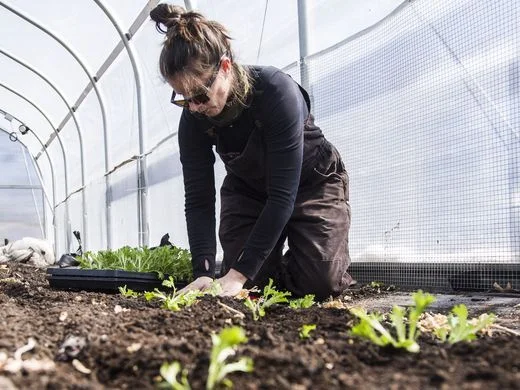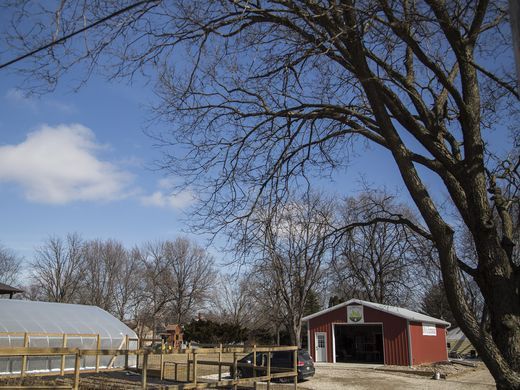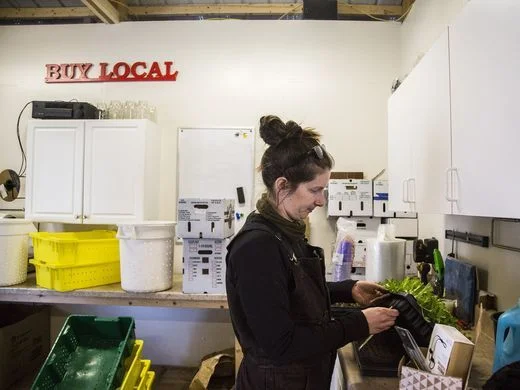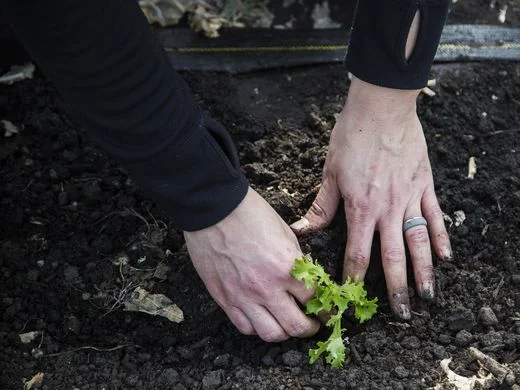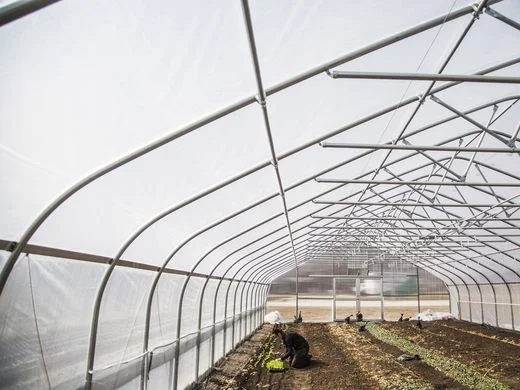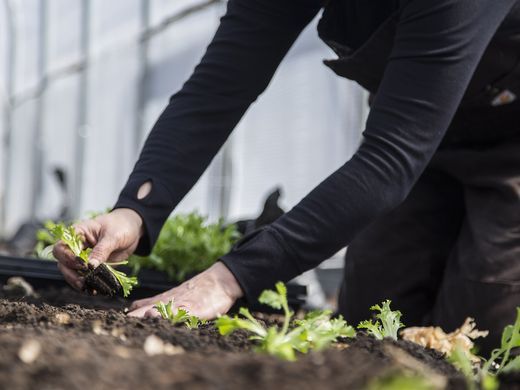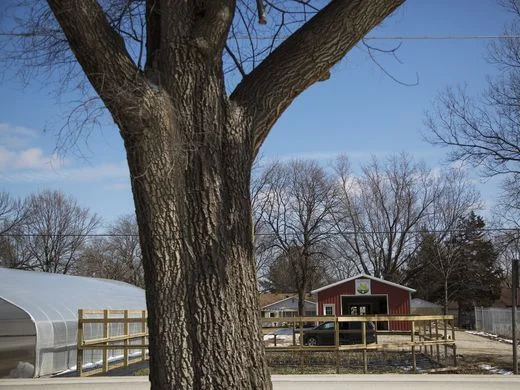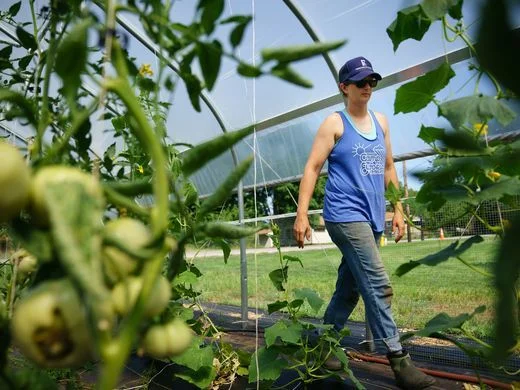A Des Moines Couple's Urban Farm Runs Into An Expensive Roadblock of Polk County Regulations
A Des Moines Couple's Urban Farm Runs Into An Expensive Roadblock of Polk County Regulations
Lee Rood, lrood@dmreg.com
March 13, 2018
Eric and Jenny Quiner, owners of Dogpatch Urban Gardens have been told by the county that their farm stand must meet commercial building requirements which means $75,000 worth of changes to their 2-year-old business. Kelsey Kremer/The Register
(Photo: Kelsey Kremer/The Register )
Spring planting is underway inside the greenhouse at Dogpatch Urban Gardens, marking what should be the most hopeful time of year for owners of Des Moines' only urban farm.
But when Eric and Jenny Quiner talks about all the changes they have to make this year on their acre lot on Meredith Drive to stay in business, the strain is palpable.
"The stress has almost been the biggest hardship in all of this,” Eric Quiner said, his voice quivering.
A March 19 meeting may tip the scale on whether the couple’s two-year-old business ultimately succeeds or fails. That's when Polk County’s Board of Adjustments will weigh in after planning and development staffers determined the Quiners’ new building amounts to a commercial storefront, not just a farm stand.
With that change comes a mix of building, landscaping, health and safety requirements for the Quiners that they say have necessitated spending about $75,000 more than expected.
2018 PEOPLE TO WATCH: Urban farmers hope to change Des Moines foodscape
The Quiners’ larger-than-a-pumpkin patch business is unique to Des Moines, but their struggle is not.
As bootstrap urban farm businesses and nonprofits have sprouted up around the country in urban centers, some have run afoul of local requirements guiding everything from food sales to water runoff to building codes.
Some cities and counties in recent years have enacted urban farming ordinances or zoning codes because the operations don’t neatly fit into regulations for residential, commercial or agricultural land.
Boise, Idaho, Denver and Kansas City, Mo., have made urban farming a permitted land use. As yet, Des Moines and Polk County have not.
Photos: Urban Garden showing local food impact in the Dogpatch
New territory, lots of questions
The Quiners feel they were open and thorough, asking questions about what they could do with the land when they first explored buying a house (now rented as an Airbnb) and property in an unincorporated part of Polk County in 2015.
That fall, Jenny sent an email to Bret VandeLune, planning and development services manager for Polk County public works, saying she and her husband wanted to grow food, sell on site, distribute to local restaurants, participate in farmers markets and start a CSA down the road.
In the spring of 2016, county building inspectors approved the couple’s plans to build a pole barn on the site to wash, sell and display Dogpatch produce.
In August, the couple asked if they would need a public restroom if they also decided to sell prepackaged meat out of that building.
VandeLune said they did not, as long as they still met requirements for a farm stand, which primarily meant that at least 50 percent of the products sold had to be grown on site and that the business did not stay open more than half the year.
“For a farm stand, selling produce and other products we will not require a public restroom,” VandeLune wrote. “Adding the sales of prepacked pork would not change that requirement, as long as the farm stand requirements are being met.”
VandeLune's email did not address the on-site pole barn, where neighbors came to buy produce.
The county's demands grew, however, after the couple applied for a conditional-use permit that would allow them to have a sign and hold special events (such as weddings) at the farm.
(A 2010 agricultural tourism ordinance allows people living in residential districts to sell vegetables and hold special events.)
Eric Quiner said they were required to hire an engineer to do a professional site plan, at a cost of about $13,000.
After that plan was completed, planning and development staffers realized the business was more than a typical Iowa farm stand.
After that, they say, the Quiners were told they would have to add restrooms and paving and parking to comply with the Americans With Disabilities Act.
They also were told they’d have to add a septic system and fencing and plant dozens of trees when their produce needs as much sun as possible.
The Quiners also had to agree to construct a berm in accordance with a flood plan for the area, although they’d already spent $7,500 adding drainage tile to mitigate the threat of their crops flooding. The couple plans to add a holding tank to capture rainwater for food production.
Jenny Quiner, of Des Moines and owner of Dogpatch Urban Gardens, prepares lettuce plants to be planted in her high tunnel greenhouse on Thursday, March 8, 2018, in Des Moines. (Photo: Kelsey Kremer/The Register )
A plea for help
The unplanned costs and changes forced the Quiners to take out a second mortgage and appeal for help from supporters with a Kickstarter campaign.
Thus far, supporters have invested more than $21,000 to help them succeed.
Still, Eric and Jenny say the stress of having their infrastructure costs double has weighed heavily on them. It's even strained their marriage.
“If we’d have known, we maybe wouldn’t have done this,” said Eric, a Realtor who works in the Beaverdale branch of Iowa Realty. “We don’t have the money.”
VandeLune said the county’s position changed because the couple built a commercial storefront on the property, which comes with specific requirements on how it is finished.
“If all they were doing is growing and selling vegetables, this wouldn’t be a problem,” he said. “They were clear they were building a building. But they weren’t clear they were building a commercial storefront.”
When the couple’s conditional-use permit was approved in March 2017, the Quiners agreed to make the changes necessary, VanderLune said.
“We’ve been working with them,” he said. “We haven’t done any enforcement."
More potentially costly decisions
On March 19, the county’s Board of Adjustments will decide whether to grant the Quiners a series of variances to keep a conditional-use permit.
The variances would allow them to forego some tree planting on the property, skip paving their driveway, increase their height of a fence to keep out deer and bypass setback requirements for the new farm-stand building.
Small-scale growing operations are not new to Polk County. But the Quiners are planning much more on their site. And they are cleared to have as many as 120 people at their special events.
“There’s got to be accommodations for parking so they are safe for the public,” VandeLune said.
In the two years, the Quiners have been in operation, they've gained considerable support from neighbors and restaurants, as well as positive press for their efforts to build community and educate the public.
The couple said revenues grew and are trending the right direction.
The Quiners are hoping all that support will move the Board of Adjustments to work with them as they strive to make their operation economically viable.
Urban farms are not easy to maintain as for-profit businesses. One recent study by a New York University professor found two-thirds of 370 self-identified urban farmers were failing to make a living from farming.
Supervisor Angela Connolly, who lives near the farm at 5085 Meredith, said she believes the Board of Adjustment is poised to approve most of the couple's requests.
"I buy my veggies there, and I think the concept's great," Connolly said. "But what they are doing is not typical. Their business model just kind of grew. And the county still has to assure it's accessible and safe. It's a unique situation."
Lee Rood's Reader's Watchdog column helps Iowans get answers and accountability from public officials, the justice system, businesses and nonprofits. Contact her at lrood@dmreg.com, 515-284-8549, on Twitter @leerood, or at facebook.com/readerswatchdog.


